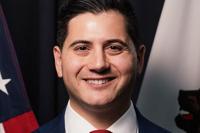
Los Angeles City Controller Kenneth Mejia
Legal claims paid out by the city of Los Angeles have soared 226% over the past five fiscal years and are now on track to cost the city $284 million in the current fiscal year, according to recent data from the City Controller’s Office.
Los Angeles City Controller Kenneth Mejia’s office told the Southern California Record in an email that the current total for legal liability payouts in fiscal year 2024-2025 was $213 million through the month of March, meaning that if the current pace of payouts continues, the city would be on the hook for $284 million in payouts for the past fiscal year, which ended June 30.
Legal payouts cost the city $87 million in fiscal year 2021, increasing to $247 million in fiscal year 2024, according to Mejia’s office. On average over the past five years, the payouts resulting from civil litigation rose 45% per fiscal year.
During the first three quarters of the current fiscal year, the Los Angeles Police Department was responsible for the highest share of the payouts at $107 million, Mejia’s office reported in March. That amount breaks down to more than $50 million due to excessive force and civil rights issues, $25 million resulting from traffic collisions, $23 million due to professional negligence and $8 million resulting from employment issues, the Controller’s Office reported.
The city departments responsible for the highest liability payouts in recent years are the Police Department, Street Services, Transportation and the Bureau of Sanitation.
In a March post on LinkedIn, the city’s chief deputy controller, Rick Cole, pointed out that rising liability payouts made up a large chunk of the city’s nearly $1 billion budget shortfall in fiscal year 2025.
“The city has under-budgeted that line item for years, but the recent spike (in liability claims) has contributed to the deficit spending during the past two years,” Cole said. “Why? Police cases lead the way, but failing infrastructure is part of the answer as well.”
One part of the solution to hold down the cost of liability payouts would be the use of internal self-insurance rates that encourage payout prevention among the city departments, he said.
A report from the City Controller’s Office last year emphasized that most liability claims are paid out of the city’s general fund rather than individual department budgets. The general fund also pays for key services for city residents, so any reduction in general fund dollars means fewer resources are available for residents, according to the report.
A report issued by City Administrative Officer Matthew Szabo on Feb. 28 identified $296 million in overspending.
“The largest over-expenditures are in liability claims due to approved and pending liability payouts and in the Fire Department due to the recently approved fire sworn labor agreement and windstorm and wildfire event response,” Szabo said.
The Palisades Fire has led to a decline in economic activity in the city and has reduced city revenues, according to the city administrative officer’s report.
Szabo also indicated that S&P Global Ratings has downgraded the Los Angeles Department of Water and Power’s credit ratings, which will make future borrowing more expensive for the public utility.
“The downgrade on the power system's bonds reflects our view that, although the utility's infrastructure has so far not been implicated as the cause of the ongoing wildfires, the increasing frequency and severity of highly destructive wildfires within LADWP's service territory and recent spread into more urban areas highlights the utility's potential vulnerability to financial liability claims that could eclipse its liquidity and insurance coverage,” S&P concluded.
The Record examined the city’s largest legal claims payouts in fiscal year 2024, which range in value from about $8 million to $39 million. The law firms that represented plaintiffs in those cases included McNicholas & McNicholas LLP, Law Offices of Dale K. Galipo, Martinian and Associates, Law Offices of Haytham Faraj, New York-based Neufeld, Scheck, Brustin, Hoffmann & Freudenberger LLP, Shegerian and Associates, and Engstrom, Lipscomb & Lack.






